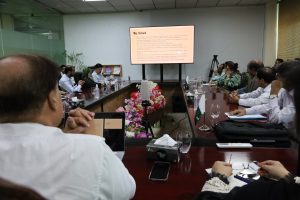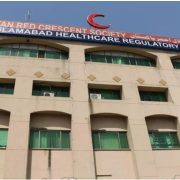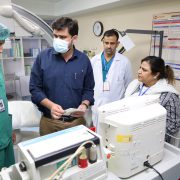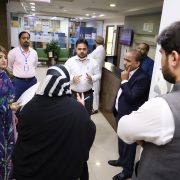Following a series of raids by the Islamabad Healthcare Regulatory Authority (IHRA) in the outskirts of Islamabad to curb quackery, trained and qualified healthcare professionals, including doctors and dentists, have started establishing clinics in these areas, officials claimed on Wednesday.
They said quacks, including dispensers and medical technicians posing as doctors and dentists, were “on the run” due to repeated raids by the IHRA teams. To fill the gaps, trained and qualified doctors and dentists are now establishing their clinics in areas such as Rawat, Bara Kaho, and Tarnol, they added.
“We have compelled many quacks to flee Islamabad, and they are now moving to other areas of the country. But, we are informing authorities in other provinces to take action against them. The resulting gap is being filled by trained and qualified healthcare professionals in low-income areas on the outskirts of Islamabad,” said Dr. Quaid Saeed, Chief Executive Officer (CEO) of IHRA, while talking to The News.
Providing details of the latest activities of the anti-quackery teams, Dr. Quaid Saeed said their inspection team sealed a hospital in the Tarnol area of Islamabad after expired injections, broken injection vials, expired blood sample tubes, and expired medicines were found inside the facility. Additionally, there was no waste management system in place, he added.
“Our inspection team sealed the hospital as it was not registered with IHRA. A doctor’s name was mentioned on the prescription pad, but he had no link with the hospital. Used IV drips and expired medicines were found in the hospital, along with many other irregularities,” he said.
The inspection teams found practitioners at various hospitals and clinics in the Tarnol area.
“When the team arrived at Mircha Stop in Tarnol and started inspecting healthcare establishments, health practitioners in the area began receiving calls about our team’s arrival, after which every healthcare establishment in the area was found closed. The inspection team then moved to another area and continued its activity there. When the team sealed one healthcare establishment in the next area at around 8:00 pm, the whole area was found closed,” he informed.
Another IHRA team in the Tarnol area sealed a clinic as it was not registered with IHRA, and a dental technician was involved in making dental fixtures and implants. Used syringes filled with lignocaine injections, dental fixtures, and braces were found.
They also sealed a medical centre as it was being run by a technician, and there was no system of infection prevention and control at the facility.
A dispensary, previously sealed by IHRA and fined Rs50,000 by the 66th hearing committee last year, was again found operational with a quack, practicing as a medical doctor. Used syringes and drips were found in the facility.
Warnings were issued to different medical stores, while qualified practitioners were found at some clinics and medical centres. Several healthcare facilities were closed down as the team reached the area, likely being run by quacks.
Another IHRA team in Sarai Kharboza on GT Road sealed a clinic, which was not registered with IHRA, where a quack was practicing as a physician at the time of inspection.
They also sealed two clinics and a medical centre for not being registered with IHRA and being run by quacks.


 The meeting was attended by Director General of Federal Environmental Protection Agency (DG-Pak EPA), District Health Officer (DHO) of Islamabad, representatives from Directorate of Health Services, National Institute of Health (NIH), participants of public and private health establishments, and waste disposal companies operating in Islamabad Capital Territory.
The meeting was attended by Director General of Federal Environmental Protection Agency (DG-Pak EPA), District Health Officer (DHO) of Islamabad, representatives from Directorate of Health Services, National Institute of Health (NIH), participants of public and private health establishments, and waste disposal companies operating in Islamabad Capital Territory.




